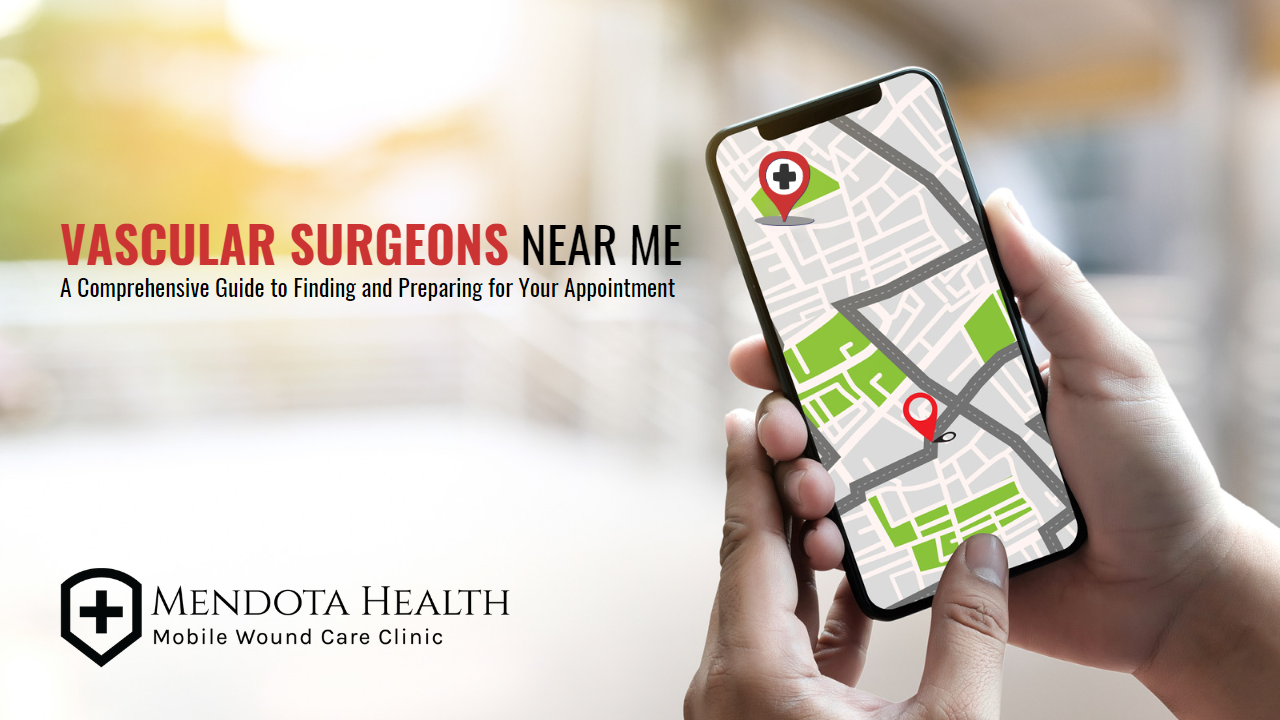
13 Jun Vascular Surgeons Near Me
If you’re in need of a vascular surgeon but finding one has been challenging to locate, you’re not alone. The search for a specialized healthcare professional can be overwhelming. Mendota Health works with vascular surgeons across the United States to provide a multidisciplinary team to treat wounds. By understanding the process and being prepared, you can ensure a smooth experience and receive the best possible care for your vascular condition. With this information you will also be able to advocate for yourself to receive post-surgical expert wound care in your home.
Why would you get sent to a vascular surgeon?
You may be sent to a vascular surgeon if you have been diagnosed with a vascular condition or if your doctor suspects a problem with your blood vessels. Vascular surgeons are experts in evaluating and managing diseases and disorders related to the blood vessels, ensuring you receive appropriate treatment and care. Mendota Health works with vascular surgeons when a patient has a complex wound. We sometimes refer our patients to vascular surgeons for procedures and then continue advanced wound care in the patient’s home when the surgery is done. In other cases, vascular surgeons refer patients to Mendota Health to provide post-surgery wound care in the patient’s home.
What are examples of vascular wounds?
Vascular wounds typically refer to wounds that result from compromised blood flow due to vascular conditions. These wounds often manifest as non-healing ulcers or sores on the lower extremities, such as the legs or feet. Common examples include venous ulcers, arterial ulcers, and diabetic foot ulcers.
Venous ulcers are caused by chronic venous insufficiency and poor blood return to the heart. Arterial ulcers result from reduced blood flow due to peripheral artery disease (PAD), while diabetic foot ulcers occur in individuals with diabetes due to nerve damage and impaired circulation.
How are vascular wounds treated?
The treatment of vascular wounds depends on the underlying cause and severity. Vascular surgeons employ various approaches, including improving blood flow through medications, minimally invasive procedures such as angioplasty or stenting, surgical interventions like bypass grafting, wound debridement, and specialized wound care techniques to promote healing. A multidisciplinary team, including wound care specialists and vascular nurses, may be involved in the treatment process.
Finding a vascular surgeon
Seek Referrals:
Start by reaching out to your primary care physician or other healthcare providers for recommendations. They can refer you to reputable vascular surgeons based on your specific needs.
Hospital or Clinic Websites:
Explore the websites of renowned hospitals or medical centers in your area. They often provide directories of their physicians, including vascular surgeons, along with their areas of expertise and contact information.
Professional Associations:
Visit the websites of professional associations related to vascular surgery, such as the Society for Vascular Surgery (SVS) or the American College of Surgeons (ACS). These organizations often offer search tools to help you find vascular surgeons in your region.
Online Directories:
Utilize online healthcare directories like Healthgrades, Vitals, or Zocdoc. These platforms provide comprehensive information about physicians, including patient reviews, qualifications, and contact details.
Preparing for Your Appointment
Medical History:
Compile your medical history, including any previous diagnoses, surgeries, or treatments related to vascular conditions. Be ready to provide this information during your appointment.
Symptoms and Concerns:
Make a note of your specific symptoms, concerns, and any changes you have observed. This will help guide the conversation with the vascular surgeon and ensure that all relevant information is shared.
Questions to Ask:
Prepare a list of questions to ask the vascular surgeon. Some potential questions include:
- What is the recommended treatment plan for my condition?
- Are there any alternative treatment options?
- What are the potential risks and complications of the suggested procedures?
- What is the expected recovery process?
- How long will the treatment take?
- What lifestyle changes or self-care measures should I consider?
Diagnostic Tests:
If you have undergone any diagnostic tests related to your vascular condition, gather the results, reports, and images. Bring them to your appointment for the surgeon’s review.
Support System:
Consider having a trusted family member or friend accompany you to the appointment. They can provide support, take notes, and help remember important details discussed during the visit.
During Your Appointment
Comprehensive Evaluation:
Expect a thorough evaluation of your vascular health, including a review of your medical history, a physical examination focused on your vascular system, and potentially additional diagnostic tests to assess your condition accurately.
Treatment Recommendations:
The vascular surgeon will discuss the diagnosis, severity of your condition, and recommended treatment options. They will explain the benefits, potential risks, and expected outcomes associated with each treatment approach.
Addressing Your Concerns:
Take the opportunity to discuss any concerns or questions you have. The vascular surgeon should provide clear explanations and ensure that you have a complete understanding of your condition and treatment options.
After Your Appointment and Follow-up Care
The surgeon will discuss the need for follow-up appointments and explain the importance of regular monitoring of your vascular health. They will outline a comprehensive plan for ongoing care and answer any queries you may have.
If you are in need of ongoing wound care have your vascular surgeon make a referral to Mendota Health. We will provide advanced wound care in your home and work with your home health agency or caregiver.
Finding a vascular surgeon near you can be made easier by utilizing referrals, hospital directories, professional associations, and online resources. By preparing for your appointment with the surgeon, compiling your medical history, understanding your symptoms, and having a list of questions ready, you can make the most of your consultation.

